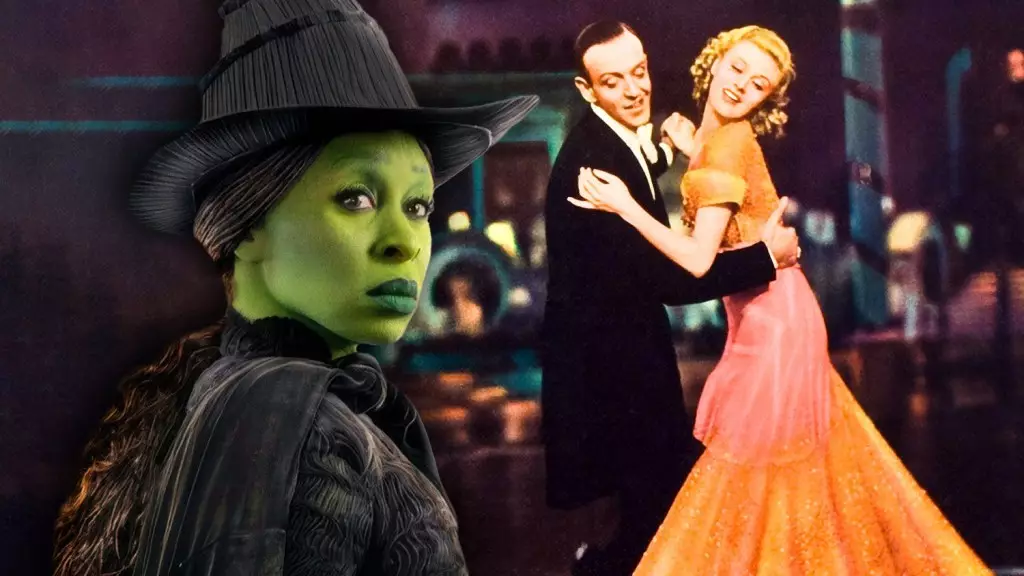The landscape of musicals has undergone significant transformation, especially in the wake of the COVID-19 pandemic, which drove many to seek comfort in the nostalgic charm of classic MGM musicals. These beloved films, characterized by their exuberant melodies and light-hearted narratives, provided a welcome escape during challenging times. However, as we move into a new era of musical storytelling, it becomes increasingly clear that contemporary musicals diverge sharply from their predecessors. Their emotional complexity and thematic depth hint at a more nuanced artistic endeavor, but they often come at the cost of the unabashed joy that defined previous generations of musical cinema.
The past brought forth iconic figures like Gene Kelly and Fred Astaire, whose performances filled the screen with joy and an element of carefree exuberance. “Singin’ in the Rain” and “Top Hat” encapsulated an era where musical numbers were joyful celebrations of life, often devoid of the complexities of the human experience. The protagonists in these films were often simple archetypes, focused on dance and romance rather than personal struggles or deeper character exploration. The escapism these films offered played a significant role in their timeless appeal, allowing audiences to momentarily forget about the troubles of the world.
As we reassess the genre, it becomes obvious that contemporary musicals like “Wicked” and “Wonka,” while undoubtedly creating waves at the box office, offer a much different texture. Modern narratives delve into intricate characters and societal themes that invite introspection. Characters portrayed by actors like Timothée Chalamet and Ariana Grande embody complexities that resonate with today’s viewers, reflecting the tumultuous experiences faced in a rapidly changing world. This shift marks the musical genre’s transformation into a medium that tackles more pressing concerns, with stories layered in personal and societal conflict.
One cannot overlook how recent productions showcase characters that reflect a multifaceted human condition. Unlike the air-headed charmers of the past, today’s protagonists grapple with inner turmoil and moral dilemmas. Take Bob Dylan’s portrayal in “Wonka”, for example, where his inward quest amid societal expectations and personal ambition mirrors a wider generational struggle with identity and purpose. The climactic scenes at the Newport Jazz Festival serve not only as a pivotal plot point but as a metaphor for the conflicts faced by the artist in a world full of critics and conformists.
In comparison, Angelina Jolie’s portrayal of Maria Callas captures the actress at a time of vulnerability, emphasizing themes of isolation and the pursuit of personal authenticity amidst the inevitable decline of fame. The complexities of her character resonate well beyond the golden age of musicals, allowing for a richer narrative that few of her predecessors were afforded. When audiences witness a character’s struggle against the backdrop of fame and personal loss, it creates a connection that transcends distance and time.
Despite the emotional weight that defines many new musicals, it is vital to recognize their intrinsic value—crafted to challenge societal norms and inspire conversation. While the joyful exuberance of classic musicals may feel distant, these modern tales imbue the genre with a different kind of exhilaration—one rooted in authenticity and emotional engagement. The juxtaposition of enchanting musical scores with profound storytelling allows for a dynamic that, while not purely joyful, resonates deeply within a contemporary context.
Moreover, the incredible musical achievements of productions like “Wicked” cannot be overlooked. The songs and performances contribute to a powerful stage presence that captures the classical essence of musicals while embracing contemporary themes. Indeed, songs that once played on repeat now serve as emotional touchstones, echoing the sentiments of a society grappling with change and complexity.
As we turn our gaze towards the future of musical cinema, it is clear that the genre will continue evolving. The contemporary musical acts not merely as entertainment but as a cultural lens, enabling audiences to explore deeper emotional landscapes. The challenge that lies ahead for creators will be striking a balance between the joyous escapism of the past and the profound explorations of today’s narratives. The potential for modern musicals to heal, inspire, and evoke thoughtful discourse reminds us of the essential role they play in our artistic landscape.
The transformation of musicals from carefree escapism to complex emotional narratives reflects the evolving nature of society itself. A new generation of filmmakers and performers is carving out pathways for the genre to explore uncharted territories of human experience, challenging us to delve deeper into our understanding of joy, sorrow, and everything in between. The musical genre, while embracing its roots, marches boldly into the future—unraveling stories that are as rich and varied as life itself.

